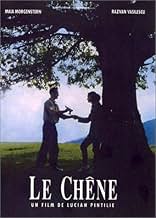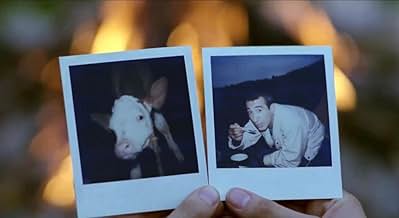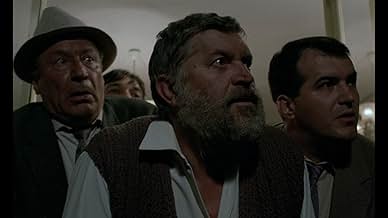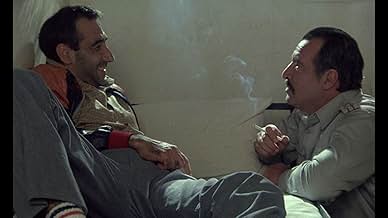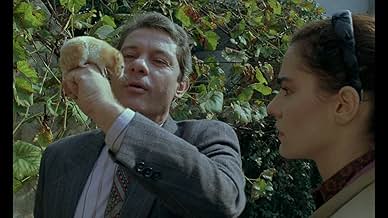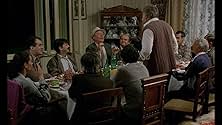NOTE IMDb
7,8/10
4,1 k
MA NOTE
Une description de la Roumanie avant la chute de Ceausescu, à travers l'histoire de Nela, qui alors qu'elle vient de perdre son père, décide de quitter Bucarest, préférant enseigner dans une... Tout lireUne description de la Roumanie avant la chute de Ceausescu, à travers l'histoire de Nela, qui alors qu'elle vient de perdre son père, décide de quitter Bucarest, préférant enseigner dans une petite ville de province.Une description de la Roumanie avant la chute de Ceausescu, à travers l'histoire de Nela, qui alors qu'elle vient de perdre son père, décide de quitter Bucarest, préférant enseigner dans une petite ville de province.
- Réalisation
- Scénario
- Casting principal
- Récompenses
- 3 victoires et 1 nomination au total
Avis à la une
Actually the Romanian title of the movie would be "Balance" or "Scales" or "Steel Yard", pick the word most appropriate to your liking for the weight measuring gadget. The international titles (The Oak, la Chene) are linked to the last scene of the movie that metaphorically wraps up significations. The main characters have found the long sought, yet not traceable balance, equilibrium.
Why did I say that it depicts humiliation of intelligence and culture? In communist Romania people that graduated university or college were repartitioned to a job matching their studies. Only the luckiest got a repartition in a large city. Others were summoned for life in hamlets, as you could not promote or change your repartition unless joining the Party. That's the case with the leading character (Maia Morgenstern) that graduated Psichology in Paris, and was repartitioned in Copsa Mica, the most polluted city in Romania.
The caravan of insults starts with the train journey to her new work place. She is forced to switch trains in the night, take her clothes off in the presence of strangers, and ride 400 km standing in an overcrowded train. As she reaches Copsa Mica some people try to rape her, police torture and threaten her, and so on.
To certify the adage that special people congregate the Psichology graduate meets a funky doctor, that manages to elude the system by being some kind of a joker. Then the rejoicing begins as these 2 people get to know each other.
When they decide under the oak tree to give birth to a child she says: "I pray he won't be normal" and he responds "If he'll be normal I'll kill him with my own hands." For these two people being "normal" meant the supreme course. Everybody around was dull, normal and communist. Enjoy!
Why did I say that it depicts humiliation of intelligence and culture? In communist Romania people that graduated university or college were repartitioned to a job matching their studies. Only the luckiest got a repartition in a large city. Others were summoned for life in hamlets, as you could not promote or change your repartition unless joining the Party. That's the case with the leading character (Maia Morgenstern) that graduated Psichology in Paris, and was repartitioned in Copsa Mica, the most polluted city in Romania.
The caravan of insults starts with the train journey to her new work place. She is forced to switch trains in the night, take her clothes off in the presence of strangers, and ride 400 km standing in an overcrowded train. As she reaches Copsa Mica some people try to rape her, police torture and threaten her, and so on.
To certify the adage that special people congregate the Psichology graduate meets a funky doctor, that manages to elude the system by being some kind of a joker. Then the rejoicing begins as these 2 people get to know each other.
When they decide under the oak tree to give birth to a child she says: "I pray he won't be normal" and he responds "If he'll be normal I'll kill him with my own hands." For these two people being "normal" meant the supreme course. Everybody around was dull, normal and communist. Enjoy!
At the time I read the book the film is based on, it was a reflection of the reality surrounding us, in Romania, therefore after the first print it was banned by the Ceausescu's communist regime. As time went by, I emigrated in the US, and seen the movie 10 years after I've read the book and although the movie supposedly is a fiction, it played like a documentary in front of my eyes. It is hard, as a Romanian, to disconnect from my personal experiences, but if anybody is interested in what the communism in Romania was like, this movie is the way to find out. The tragic and the comedy are coming together to weave the fabric of a society so sick, that life becomes surreal. For my money this is a great movie, the fresco of a society governed by rules unknown to civilization.
The second Pintilie movie I have seen recently (thanks to Duna TV) and even better than the previous one (O Vara de neuitat): a great movie indeed! This is the Romanian version of Kusturica's Underground, or perhaps I should I say the opposite, since Balanta is actually an earlier piece. The fast-paced, furious story packed with bitter irony and surrealistic moments (well, the closer you live to the country, the less surrealistic they are: comments from people living in Ceausescu's Romania state that the film has nothing "unreal" in it) captures the essence of one of the darker dictatorships of the former Communist Bloc, where the harshness of oppression is softened only by the corruption of the society. Just like Kusturica in Underground, Pintilie presents a very critical picture of the society but at the same time he clearly shows his sympathy towards his suffering but talented and charming nation. All in all: stunning pictures, perfect acting and shocking scenes combine in Balanta for a perfect piece of cinema.
This film would have been one of the greatest ever if only the actors spoke more naturally! It's extremely strange to hear such talented actors (Maia Morgenstern, Razvan Dumitrescu and a few others) throw their lines with almost the same intonation every time. I don't know how the great director Pintilie accepted that (or is there some 'hidden' symbol in that?). First I have read the excellent novel by Ion Baiesu (one of my favorite authors when it comes to humor), and I was thrilled by its real feel, biting satire and cruel situations. It has memorable characters and formidable dark humor. So the film was a little disappointing for me, but it's still a 'must re-watch' any time. A special note for the cameos by Victor Rebengiuc and Dorel Visan, two of the best actors I've ever seen.
I' give'it a ten because character Mitica is based on a real life person that happens to be my father(not biological but the person who raised me). My father is a urological surgeon that never took money from his patients (I know sounds unrealistic especially for Romania, but is true). One of his patients was Ion Baiesu, who was really impressed by him so he wrote the short novel "thirty-eight point two" and dedicated him. Also the movie "Mere Rosii" (red apples) is about my father.
If you want to know more just e-mail me at Whitenight2mw on yahoo.
Soryy if my grammar isn't so good.
If you want to know more just e-mail me at Whitenight2mw on yahoo.
Soryy if my grammar isn't so good.
Le saviez-vous
- ConnexionsFeatured in Filmare/Filmage (1992)
Meilleurs choix
Connectez-vous pour évaluer et suivre la liste de favoris afin de recevoir des recommandations personnalisées
Détails
Box-office
- Budget
- 3 700 000 $US (estimé)
Contribuer à cette page
Suggérer une modification ou ajouter du contenu manquant


